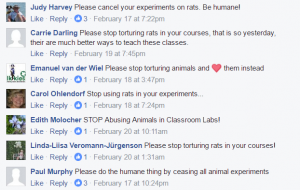PETA renews efforts to end UHCL’s lab rat experiments
During Spring of 2016, University of Houston-Clear Lake was contacted by People for the Ethical Treatment of Animals (PETA) for experimenting with live rats in PSYCH 5235 Learning Principles.
Last year, a UHCL student contacted PETA saying that UHCL was not providing its lab rats with food and was starving them for experimental purposes. The student told PETA there was a rat in such distress that “she sat motionless in the corner of her chamber for 15 minutes.” The Houston Chronicle also wrote an article about this incident.
In recent months, PETA has renewed its efforts to get UHCL to stop the practice of using live rats.
“Our efforts are to end the use of live rats in an experiment in the Learning Principles PSYC 5235 course,” said Kathy Guillermo, senior vice president of PETA. “The sensitive beings suffer greatly when they are deprived of their natural habitat and confined to small barren cages, then handled by students and deprived of food for extended periods of time during psychological experiments.”
Guillermo said UHCL has been hesitant to come forward with the information needed to resolve this ongoing situation and that PETA has contacted UHCL multiple times trying to get public records that show what UHCL does with the rats when they are no longer of use. Last year, the Attorney General ruled in PETA’s favor to get the animals’ medical records released. However, Guillermo said these records were incomplete, and no information about what happens to the rats after the experiments were included. PETA is currently in the process of appealing another denial of records access by UHCL.
PETA sent emails out to its members in February urging them to ask UHCL to stop the practice of experimenting with rats. Since then, UHCL has been receiving another round of backlash as a string of comments left by animal activists have been making their way to random posts on UHCL’s Facebook page.

Comments such as, “Please do the humane thing by ceasing all animal experiments” and “Please stop using animals in your experiments. This makes me so sad. There is no need for this anymore!!!” These comments are located on the graduation deadline post from Feb. 17.
“[PETA] sent out an email to members a week or two ago,” said Laura Kramer, director of operations and communications at High Meadows Institute, who contributed one of the comments on UHCL’s Facebook page.
“So far, more than 90,000 people have sent emails to the university urging it to switch to better, animal-free methods of teaching these concepts,” Guillermo said.
A Facebook page called Precious World reposted PETA’s letter concerning UHCL on Feb. 22; it received over 49 likes and 11 shares. Precious World reposted PETA’s letter to spread the word that UHCL’s use of lab rats still has not been resolved.
More than 73,556 people have signed PETA’s online petition to stop UHCL from experimenting on live rats.
“People have the right to voice their opinions/concerns in the way that best suits them, which in this case, was in response to social media posts,” said William Staples, president of UHCL, George Mattingly, coordinator of social media and communications, Theresa Presswood, executive director of university communications, and Erin Willey, coordinator of web communications in a joint statement. “UHCL disagrees with the characterizations of its treatment of the animals used in Psychology 5235 as those animals are treated humanely and with concern for their wellbeing.”
Institutions that use animals for research, teaching or testing are mandated by federal law to maintain an Institutional Animal Care and Use Committee (IACUC Central). The committee inspects where the animals are housed, used and ensure ethical practice of euthanasia.
Kramer stresses that UHCL’s Pearland campus teaches the same course using “interactive computer simulations and training sessions with adoptable dogs at a local animal shelter to learn about animal behavior.”
PSYC 3321 Learning is the course Kramer is referring to, an undergrad course that does not use live rats. PSYC 5235, a graduate course that uses live rats, is not offered at UHCL’s Pearland campus.
Michael Hunt, comparative psychologist and adjunct instructor of psychology said, “rats are still being used” and that he “has not heard anything further about where PETA stands.”
Hunt teaches PSYC 3321 Learning. He uses a computer software called “Sniffy the Virtual Rat.”
Professors who teach the graduate-level PSYC 5235 Learning Principals course defend the program’s use of live rats versus virtual rats.
“Because computer simulations do not have the behavioral variability of a living organism, they are not as effective for students learning behavioral therapy techniques,” said Sarah Lechago, assistant professor in General Psychology and Behavior Analysis, and Jennifer Fritz, associate professor in the department of Clinical, Health, and Applied Sciences, in a joint statement. “There is no substitute for seeing that a living being reacts as predicted to the appropriate arrangement of contingencies. The faculty, staff and administration of University of Houston-Clear Lake care deeply about all animals used in our educational programs and strive to not only fulfill all legal requirements that govern the use of animals in teaching our students, but to exceed those requirements. The university’s Institutional Animal Care and Use Committee (IACUC) reviews all aspects of animal use to confirm that the guiding principles underlying humane care and use have been duly considered.”


Good for the student who blew the whistle and good for PETA for working to end this cruelty. Rats are living, feeling beings–not test tubes.
GOOD JOB ON THE ARTICLE!